Despite having great misfortune in her long life, Mom lived it fully and with complete love. Indeed, she was my hero. She was my world.
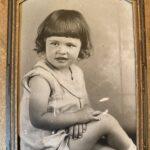
Mom was born on a Minnesota farm, and while that sounds idyllic, she was surrounded by trauma. After her parent’s divorce, Grandma had Mom kidnapped and committed Grandpa to an asylum. Mom’s only sister Grace, who I named my nonprofit for, saved Mom by sneaking her food while Grandma starved her. Grace, who was the scapegoat in her family, paid the ultimate price when she died from leukemia at age 20. Mom always said Grace died from a broken heart.
Mom’s father was her light, and she adored him. She was allowed holidays when she visited his farm, and her favorite childhood memories were his many frolicking, well attended music parties. You see, music was Grandpa’s great passion, and he’d played trombone in the John Philip Sousa band during WWI. A quote of Grandpa’s Mom loved to share was, “Once you get show business in your blood, you can never get it out.”
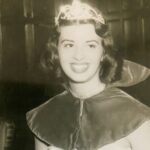 Later, Mom found her own spotlight, and though I never, ever heard my mid-west mom brag, and she would be SO embarrassed by this sharing, she was homecoming queen in high school and college. She was also head cheerleader back in the day when cheerleaders were also quasi-gymnasts, backflips and all. Being from the state of 10,000 lakes, Mom loved water sports, and became a professional synchronized swimmer, traveling the country with the Aqua Follies. Now this was a big deal, because they performed before 4,000 people nightly with the Olympic divers of the time.
Later, Mom found her own spotlight, and though I never, ever heard my mid-west mom brag, and she would be SO embarrassed by this sharing, she was homecoming queen in high school and college. She was also head cheerleader back in the day when cheerleaders were also quasi-gymnasts, backflips and all. Being from the state of 10,000 lakes, Mom loved water sports, and became a professional synchronized swimmer, traveling the country with the Aqua Follies. Now this was a big deal, because they performed before 4,000 people nightly with the Olympic divers of the time.
Mom met Daddy in college choir, and she married him (a day she always described as “the worst of my life”) a week after graduation to get away from her mom. Despite being brilliant and earning a PhD in economics at MIT, Daddy was a deeply troubled man due to his childhood trauma. An alcoholic and frequent physical and emotional abuser of Mom, he was plagued by paranoid schizophrenia.
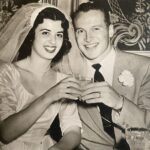 In quick order, Mom did what wives were supposed to do back then. She popped out five kids, though she later confessed to me, matter-of-factly, that wasn’t her original design. She wanted to be a movie star. So instead of the silver screen, Mom, as she often quipped, “spent ten years with my hands in poop.”
In quick order, Mom did what wives were supposed to do back then. She popped out five kids, though she later confessed to me, matter-of-factly, that wasn’t her original design. She wanted to be a movie star. So instead of the silver screen, Mom, as she often quipped, “spent ten years with my hands in poop.”
Following their divorce and my father’s suicide when I was eight-years-old, Mom got into intense psychotherapy, then blossomed. After living in Boston and Ann Arbor, she detested the California suburban “cracker box” Dad was hiding her out in. So, like any liberated woman of the 60’s, she broke down the walls. Literally. She replaced them with stained glass and skylights, opening up what was once closed off. Mom designed a sunken living room to display her most prized possession: the grand piano that was her dad’s. No complaints here as I was the family’s sole piano player.
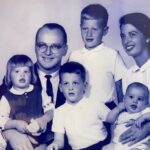 Money was always tight, and the cupboards sometimes bare. So, to raise her brood, Mom flipped houses before it was a thing. I think she invented that. Her unconventionality was further expressed by being a free-spirit Unitarian and, worse yet for suburban sensibilities, an abstract artist. She covered her walls (the ones still up!) with her huge colorful paintings and intricate drawings.
Money was always tight, and the cupboards sometimes bare. So, to raise her brood, Mom flipped houses before it was a thing. I think she invented that. Her unconventionality was further expressed by being a free-spirit Unitarian and, worse yet for suburban sensibilities, an abstract artist. She covered her walls (the ones still up!) with her huge colorful paintings and intricate drawings.
Then there was our backyard; a cornucopia of ducks, chickens, snakes, rats, bullfrogs and guinea pigs. There was a dog, a rooster, a horse – all topped off by, and I’m not exaggerating, hundreds of bunny rabbits. They did their thing under the house, in the yards, and in our magical backyard creek, even hopping up and down the street.
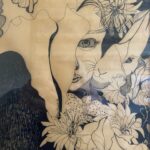 209 Powell Avenue was the neighborhood fun house; no knocking needed, just walk on in. Mom threw birthday parties for many of the local kids, and her New Year’s Eve bashes were legendary. The joke was the entire city was invited, and on more than one occasion, I’ve bumped into a person who’s told me their favorite thing ever was singing Auld Lang Syne at Mom’s. Again, no complaints, as New Year’s Eve is my birthday.
209 Powell Avenue was the neighborhood fun house; no knocking needed, just walk on in. Mom threw birthday parties for many of the local kids, and her New Year’s Eve bashes were legendary. The joke was the entire city was invited, and on more than one occasion, I’ve bumped into a person who’s told me their favorite thing ever was singing Auld Lang Syne at Mom’s. Again, no complaints, as New Year’s Eve is my birthday.
Each summer, to the horror of our white flight neighbors, Mom “adopted” Terry Lemon, a loving, boisterous young African- American boy from the tough streets of Oakland. Terry became my brother. Mom also engaged in a Native American exchange program and David Pino became one of the fun-loving cast of characters who’d gravitate around Mom’s massive wood-shopped kitchen counter, plied with sheets of chicken wings or boat-sized lasagnas or, my favorite, all-you-can-eat spaghetti. I remember Mom once sharing with me, “Everything that’s important in the world is happening around the Toussaint kitchen counter.”
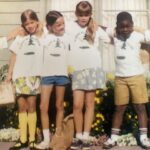 With yearning for the lights still stirring, Mom jumped head-first into community theatre, getting cast in many shows, some that I was lucky to do with her. Fortunately for me, her penchant for entertaining crossed over to hosting cast parties, and, at her first 45 years ago, I met John, the love of my life. Mom also became an accomplished modern dancer – and later took that and acting to New York, where she performed Off-Broadway and studied under Merce Cunningham. Like every hot-blooded, straight (and some not so straight) man, Merce was smitten.
With yearning for the lights still stirring, Mom jumped head-first into community theatre, getting cast in many shows, some that I was lucky to do with her. Fortunately for me, her penchant for entertaining crossed over to hosting cast parties, and, at her first 45 years ago, I met John, the love of my life. Mom also became an accomplished modern dancer – and later took that and acting to New York, where she performed Off-Broadway and studied under Merce Cunningham. Like every hot-blooded, straight (and some not so straight) man, Merce was smitten.
Above all else, Mom was a fierce advocate for her kids, regularly taking on administrators in the poorly run schools we attended. And when I got sick with the life-altering chronic pain disease, Complex Regional Pain Syndrome, triggered by a ballet injury, Mom was by my side. She joined me at every appointment, fighting against the misogynistic doctors who said the problem was all in my head. On her old manual, Mom typed 200 scorched-earth letters and sent them to the HMO that ultimately failed me. I’ll never forget, after yet another “no-care appointment” as she coined them, Mom picked up my 50-pound wheelchair and bashed it into our car, again and again, yelling “They’re killing my daughter!”
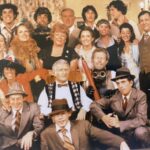 When I had to leave professional dancing and move back to Mom’s in sleepy suburbia, a silver-lining emerged. During those years of pain and loss, though always close, we formed a tighter bond where she purged intimate family secrets, unwittingly connecting past traumas to present ills. Later, I would prize these insights as springboards for my nonprofit work, linking trauma with chronic illness.
When I had to leave professional dancing and move back to Mom’s in sleepy suburbia, a silver-lining emerged. During those years of pain and loss, though always close, we formed a tighter bond where she purged intimate family secrets, unwittingly connecting past traumas to present ills. Later, I would prize these insights as springboards for my nonprofit work, linking trauma with chronic illness.
Sadly, Mom developed Alzheimer’s about 20 years ago, severe in the last decade of her life. I agree with the emerging research that suggests dementia is an auto-immune disease sparked by childhood trauma. In our dysfunctional family, it was heartbreaking to watch people manipulate and abuse Mom in her advanced years. Still, she never lost her zest for life, sense of humor or beaming smile. She certainly didn’t lose her love for music. After the disease rendered her mostly non-verbal, Mom would often burst out into an old tune mid-meal. “Chattanooga Choo Choo” was one of her favorites.
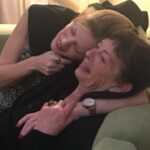 A story that perfectly captures Mom’s spirit happened on September 11th, 2001. As John and I watched the towers go down while visiting his parents in Oregon, I was terrified the world was coming to an end, and had to get to Mom’s as I knew it was the only safe place on the planet. It was a long and eerily quiet six-hour drive through the redwoods, no planes above and little radio contact in the car. Expecting doom and gloom at Mom’s house, I should have known better. Of course, she was throwing a party. She was hosting young people from around the world, and we celebrated life and each other that evening: feasting, singing, dancing and laughing. That was my mom, rocking hope in the darkest of times.
A story that perfectly captures Mom’s spirit happened on September 11th, 2001. As John and I watched the towers go down while visiting his parents in Oregon, I was terrified the world was coming to an end, and had to get to Mom’s as I knew it was the only safe place on the planet. It was a long and eerily quiet six-hour drive through the redwoods, no planes above and little radio contact in the car. Expecting doom and gloom at Mom’s house, I should have known better. Of course, she was throwing a party. She was hosting young people from around the world, and we celebrated life and each other that evening: feasting, singing, dancing and laughing. That was my mom, rocking hope in the darkest of times.
This is the last picture Mom and I had taken together. It was on September 15th, her 92nd birthday. A group of us were singing “Happy Birthday”, and as is the way with Alzheimer’s, Mom sweetly beamed at me just after saying, for maybe the 12th time that day, “I didn’t know it was my birthday!” Before blowing out her candles, her wish was to live for 50 more years. I wished for that too.
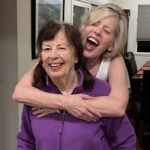
Mom, your candles will never go out, your light will never dim, and your love will forever push me forward …
